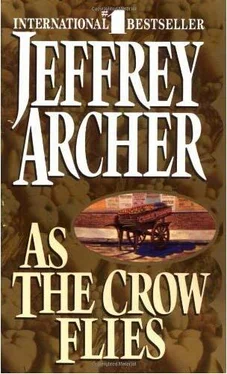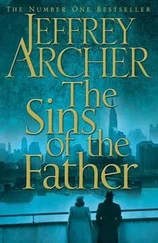"Then you must have also found your thief," said Mrs. Trentham with disdain.
"Hardly, madam. You see, the gentleman in question has only one leg."
Mrs. Trentham still showed no concern. "Then I suggest you ring Chelsea Police Station," she said, "as I feel sure they will be able to enlighten you further on the matter."
"But I'm from Chelsea Police Station myself," replied the inspector, looking even more puzzled.
Mrs. Trentham rose from the sofa and walked slowly over to her desk, pulled open a drawer and removed a single sheet of paper. She handed it to the inspector. His face reddened as he began to take in the contents. When he had finished reading the document he passed the piece of parer back.
"I do apologize, madam. I had no idea that you had reported the loss of the greatcoat the same day. I shall have a word with young Constable Wrigley just as soon as I get back to the station." Mrs. Trentham showed no reaction to the policeman's embarrassment. "Well, I won't take up any more of your time," he said. "I'll just show myself out."
Mrs. Trentham waited until she heard the door close behind him before picking up the phone and asking for a Paddington number.
She made only one request of the detective before replacing the receiver.
Mrs. Trentham knew that Guy must have arrived safely in Australia when her check was cleared by Coutts and Company through a bank in Sydney. The promised letter to his father arrived on the doormat a further six weeks after that. When Gerald imparted to her the contents of the letter, explaining that Guy had joined a firm of cattle brokers, she feigned surprise at her son's uncharacteristic action, but her husband didn't seem to show a great deal of interest either way.
During the following months Harris' reports continued to show that Trumper's newly formed company was going from strength to strength, but it still brought a smile to Mrs. Trentham's lips when she recalled how for a mere four thousand pounds she had stopped Charles Trumper right in his tracks.
The same smile was not to return to Mrs. Trentham's face again until she received a letter from Savill's some time later, presenting her with an opportunity to repeat for Rebecca Trumper the same acute frustration as she had managed in the past for Charlie Trumper, even if this time the cost to herself might be a little higher. She checked her bank balance, satisfied that it would prove more than adequate for the purpose she had in mind.
Over the years Savill's had kept Mrs. Trentham well informed of any shops that came up for sale in Chelsea Terrace but she made no attempt to stop Trumper from purchasing them, reasoning that her possession of the flats would be quite adequate to ruin any long-term plans he might have for the whole Terrace. However, when the details of Number 1 Chelsea Terrace were sent to her she realized that here the circumstances were entirely different. Not only was Number 1 the corner shop, facing as it did towards the Fulham Road, and the largest property on the block, it was also an established if somewhat run-down fine art dealer and auctioneer. It was the obvious outlet for all those years of preparation Mrs. Trumper had put in at Bedford College and more recently at Sotheby's.
A letter accompanying the bill of sale asked if Mrs. Trentham wished to be represented at the auction that Mr. Fothergill, the present owner, was proposing to conduct himself.
She wrote back the same day, thanking Savill's but explaining that she would prefer to carry out her own bidding and would be further obliged if they could furnish her with an estimate of how much the property might be expected to fetch.
Savill's reply contained several ifs and buts, as in their view the property was unique. They also pointed out that they were not qualified to offer an opinion as to the value of the stock. However, they settled on an upper estimate, in the region of four thousand pounds.
During the following weeks Mrs. Trentham was to be found regularly seated in the back row of Christie's, silently watching the various auctions as they were conducted. She never nodded or raised a hand herself. She wanted to be certain that when the time came for her to bid she would be thoroughly familiar with the protocol of such occasions.
On the morning of the sale of Number 1 Chelsea Terrace Mrs. Trentham entered the auctioneer's wearing a long dark red dress that swept along the ground. She selected a place in the third row and was seated some twenty minutes before the bidding was due to commence. Her eyes never remained still as she watched the different players enter the room and take their places. Mr. Wrexall arrived a few minutes after she had, taking a seat in the middle of the front row. He looked grim but determined. He was exactly as Mr. Harris had described him, mid-forties, heavily built and balding. Being so badly overweight he looked considerably older than his years, she considered. His flesh was swarthy and whenever he lowered his head several more chins appeared. It was then that Mrs. Trentham decided that should she fail to secure Number 1 Chelsea Terrace a meeting with Mr. Wrexall might prove advantageous.
At nine-fifty precisely Colonel Hamilton led his two colleagues down the aisle and filed into the vacant seats immediately behind Mrs. Trentham. Although she glanced at the colonel he made no effort to acknowledge her presence. At nine-fifty there was still no sign of either Mr. or Mrs. Trumper.
Savill's had warned Mrs. Trentham that Trumper might be represented by an outside agent, but from all she had gathered about the man over the years she couldn't believe he would allow anyone else to carry out the bidding for him. She was not to be disappointed for when the clock behind the auctioneer's box showed five minutes before the hour, in he strode. Although he was a few years older than he'd been at the time of the photograph she held in her hand, she was in no doubt that it was Charlie Trumper. He wore a smart, well-tailored suit that helped disguise the fact that he was beginning to have a weight problem. A smile rarely left his lips though she had plans to remove it. He seemed to want everyone to know he had arrived, as he shook hands and chatted with several people before taking a reserved seat on the aisle about four rows behind her. Mrs. Trentham half turned her chair so she could observe both Trumper and the auctioneer without having continually to look round.
Suddenly Mr. Trumper rose and made his way towards the back of the room, only to pick up a bill of sale from the table at the entrance before returning to his reserved place on the aisle. Mrs. Trentham suspected that this performance had been carried out for some specific reason. Her eyes raked each row and although she could see nothing untoward she nevertheless felt uneasy.
By the time Mr. Fothergill had climbed the steps of the auctioneer's box, the room was already full. Yet despite almost every place having been taken Mrs. Trentham was still unable to see if Mrs. Trumper was seated among the large gathering.
From the moment Mr. Fothergill called for the first bid the auction did not proceed as Mrs. Trentham had imagined, or indeed planned. Nothing she had experienced at Christie's during the previous month could have prepared her for the final outcome—Mr. Fothergill announcing a mere six minutes later, "Sold for twelve thousand pounds to Mrs. Gerald Trentham."
She was angry at having made such a public spectacle of herself, even if she had secured the fine art shop and dealt a satisfying blow to Rebecca Trumper. It had certainly been done at a considerable cost, and now she wasn't even certain she had enough money in her special account to cover the full amount she had committed herself to.
After eighty days of soul-searching, in which she considered approaching her husband and even her father to make up the shortfall, Mrs. Trentham finally decided to sacrifice the one thousand and two hundred pounds deposit, retreat and lick her wounds. The alternative was to admit to her husband exactly what had taken place at Number 1 Chelsea Terrace that day.
Читать дальше












